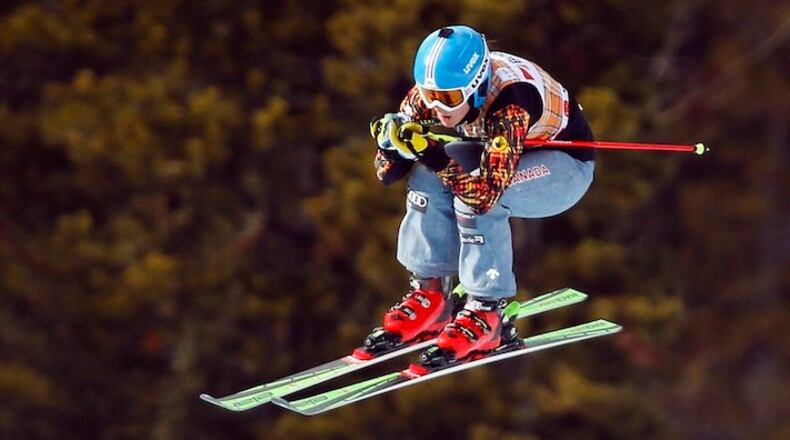The term "Winter Olympian" is something of a misnomer — given how hard these athletes train in summer.
Although there is no telling who will scoop up medals at the Winter Games in South Korea, it's already pretty clear who won't: those athletes who didn't sweat buckets, hone their skills and perfect new tricks long before the first snows fell. When vacationers hit the summer beaches, winter athletes hit the gym .
"A medal at the Olympic Games in February is primarily won with work done in the summer," says Frederic Jean, a biathlon coach for the French national team.
Atop biathletes' 'to-do' list in the long off-season from mid-April to the end of October: "A big base-layer of weight-training, roller-skiing, cycling, running, and also a lot of shooting," Jean said.
"This is really when a medal is won," Jean added, speaking at a summer biathlon championship in eastern France that served as a tune-up for Pyeongchang-bound athletes. "The athlete accumulates hours of hard training, so he enters the start of winter with improving form and peaks for his goal of the Olympic Games in mid-February."
Here's a look at how some expected top contenders trained this summer:
DAVID MORRIS, aerials skier, Australia
During five grueling months of somersaulting into a pool in Utah, the 2014 silver medalist perfected a new trick — three flips with five twists — that could help him medal again.
"I haven't done it on snow yet. This year will be the first time that I'll attempt five twists on snow. I'm very terrified," Morris said in a phone interview upon his return to Australia.
He logged every jump — 846 in all. And he counted the stairs he climbed back to the top each time: 155 for the big ramp; 135 on the smaller one.
"That's with wet soaking boots, carrying skis, with a life jacket and a wet suit and all this stuff," he said. "All the cardio that I need to do for the whole summer. I don't need to get on a bike or anything. It's hours of just walking stairs."
Summer training builds the confidence needed to perform in the cold.
"Very rarely will someone do a new skill on snow for the first time. It's just too dangerous," Morris said. "The chances of you landing on your head or busting your knees or breaking your neck are quite high. It's calculated risk, but only because we've done so many (jumps) in the summer."
"You can make all your mistakes on water and get away with it, so that you don't have to make them on snow," he added. "You set yourself up for a good winter by having a good summer."
BEN CAVET, moguls skier, France
The 23-year-old wants to land a jump at the Olympics that no-one has successfully performed in competition: the devilishly difficult off-axis quadruple spin known as the 'cork 1440.'
He practiced it hundreds of time this summer into water, "big sessions of 10 times this trick a day, 15 times of this trick a day."
"I've been obsessed with this thing since this spring, you know? Just thinking about it a lot," he said. "Then taking it to (the) water jump, and then working hard on it on water jump and then doing it this summer on snow."
In South Korea, he expects to go head-to-head with Canadian Mikael Kingsbury, a 2014 silver medalist who posted video of himself in August doing the 1440.
"If I do it, he's going to do it. So it will be fun," Cavet said. "To be on the podium, I don't think we can say that we need it, but it would be pretty cool to do."
KELSEY SERWA, freestyle skier, Canada
Forget summer vistas: The 2014 ski-cross silver medalist largely saw the inside of a gym.
"We spend, I would say, upward of 10 hours a day, six days a week, training on our strength and endurance and coordination and balance, agility," she said in a phone interview. "Hopefully, it translates when we get on snow."
Video she posted from training in September showed the 28-year-old impressively negotiating a row of giant inflatable balls, precariously jumping from one to the next in a demonstration of the strength and balance she will need to stay on her skis in rough-and-tumble Olympic races, elbow-to-elbow against other competitors over big jumps and banked bends.
"We do a lot of gym strength-training, a lot of mountain biking, gymnastics as well, and I like to balance that all with yoga, it helps my body stay nimble and loose," she said. "Basically, anything goes. I have a paddleboard also. I like to get out on the water. That's great for core stability."
"At the Olympic level, every athlete is very similar in terms of their dedication and their technical abilities and strengths," she added. "Often, on race day, a lot of it comes down to who is mentally the fittest."
MARTIN FOURCADE, biathlon, France
The double-gold medalist in 2014 finds summer training mentally taxing: Tough seeing friends and family leave for vacation while staying back to work.
"The hardest thing to do is to keep the motivation," he said. "Biathlon preparation is six or seven months, out of the snow, far from your goals."
"Most of the job is done before the winter starts," Fourcade said.
About the Author
Keep Reading
The Latest
Featured

